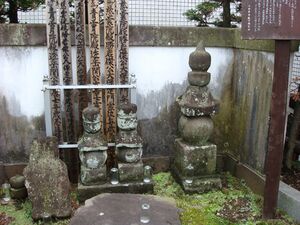Difference between revisions of "Hojo Ujiteru"
| Line 4: | Line 4: | ||
* ''Titles: Mutsu no kami'' | * ''Titles: Mutsu no kami'' | ||
| − | Ujiteru was the 2nd son of [[Hojo Ujiyasu|Hôjô Ujiyasu]] and was adopted into the [[Oshi clan|Ôshi family]]. He held [[Takiyama castle|Takiyama]] and then [[Hachioji castle]] in [[Musashi province]]. Ujiyasu is said to have considered Ujiteru superior to his elder brother [[Hojo Ujimasa|Ujimasa]] in most respects, although he was most noted for his diplomatic ability. Along with his brother [[Hojo Ujikuni|Ujikuni]], Ujiteru was defeated at the [[battle of Mimasetoge]] by [[Takeda Shingen]] ([[1569]]). He later urged his brother Ujimasa to form an alliance with [[Oda Nobunaga]]. Although the [[Hojo clan|Hôjô]] and [[Oda clan|Oda]] had nominally cooperated in the invasion of the [[Takeda clan|Takeda]] domain in the Spring of [[1582]], Ujimasa distrusted Nobunaga's intentions and was roused by Oda encroachment into [[Kozuke province|Kôzuke]]. He disregarded Ujiteru's advice, which at any rate became a moot point with Nobunaga's death in June. When [[Odawara castle|Odawara]] surrendered to [[Toyotomi Hideyoshi]] in August of 1590, Ujiteru was made to commit suicide along with Ujimasa. | + | Ujiteru was the 2nd son of [[Hojo Ujiyasu|Hôjô Ujiyasu]] and was adopted into the [[Oshi clan|Ôshi family]]. He held [[Takiyama castle|Takiyama]] and then [[Hachioji castle]] in [[Musashi province]]. Ujiyasu is said to have considered Ujiteru superior to his elder brother [[Hojo Ujimasa|Ujimasa]] in most respects, although he was most noted for his diplomatic ability. Along with his brother [[Hojo Ujikuni|Ujikuni]], Ujiteru was defeated at the [[battle of Mimasetoge]] by [[Takeda Shingen]] ([[1569]]). He later urged his brother Ujimasa to form an alliance with [[Oda Nobunaga]]. Although the [[Hojo clan|Hôjô]] and [[Oda clan|Oda]] had nominally cooperated in the invasion of the [[Takeda clan|Takeda]] domain in the Spring of [[1582]], Ujimasa distrusted Nobunaga's intentions and was roused by Oda encroachment into [[Kozuke province|Kôzuke]]. He disregarded Ujiteru's advice, which at any rate became a moot point with Nobunaga's death in June. When [[Odawara castle|Odawara]] surrendered to [[Toyotomi Hideyoshi]] in August of 1590, Ujiteru was made to commit suicide along with Ujimasa. Their graves, today just a short walk from Odawara Station, are said to have been placed atop the same stone where the two brothers performed their ''[[seppuku]]''.<ref>Plaques at gravesite.</ref> |
==References== | ==References== | ||
| − | * Initial text from [http://www.samurai-archives.com Samurai-Archives.com] FWSeal & CEWest, 2005 | + | * Initial text from [http://www.samurai-archives.com Samurai-Archives.com] FWSeal & CEWest, 2005. |
| + | <references/> | ||
[[Category:Samurai]][[Category:Sengoku Period]] | [[Category:Samurai]][[Category:Sengoku Period]] | ||
Revision as of 00:15, 26 July 2015

Ujiteru was the 2nd son of Hôjô Ujiyasu and was adopted into the Ôshi family. He held Takiyama and then Hachioji castle in Musashi province. Ujiyasu is said to have considered Ujiteru superior to his elder brother Ujimasa in most respects, although he was most noted for his diplomatic ability. Along with his brother Ujikuni, Ujiteru was defeated at the battle of Mimasetoge by Takeda Shingen (1569). He later urged his brother Ujimasa to form an alliance with Oda Nobunaga. Although the Hôjô and Oda had nominally cooperated in the invasion of the Takeda domain in the Spring of 1582, Ujimasa distrusted Nobunaga's intentions and was roused by Oda encroachment into Kôzuke. He disregarded Ujiteru's advice, which at any rate became a moot point with Nobunaga's death in June. When Odawara surrendered to Toyotomi Hideyoshi in August of 1590, Ujiteru was made to commit suicide along with Ujimasa. Their graves, today just a short walk from Odawara Station, are said to have been placed atop the same stone where the two brothers performed their seppuku.[1]
References
- Initial text from Samurai-Archives.com FWSeal & CEWest, 2005.
- ↑ Plaques at gravesite.